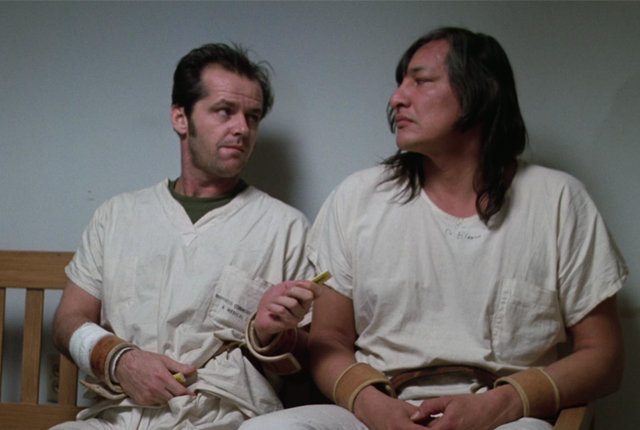Episodes: One Flew Over the Cuckoo's Nest and why "of its time" rarely has meaning

At the recent TCM Classic Film Festival (which I talked about in the last newsletter), I ended up taking in One Flew Over the Cuckoo's Nest, thanks to missing another screening. I hadn't seen the film since college, when I had confirmed it to be one of my favorites, and the experience of watching it in 2016 proved slightly disquieting.
The problem with Cuckoo's Nest has always been its low-grade misogyny, something that's an improvement over the book the film is based on, which is basically just out and out sexist. And this isn't something people have just decided recently. I knew about that interpretation of the book before I read it, thanks to an installment of the TLC series Great Books (which I really wish someone would revive). The fact that Cuckoo's Nest has, at its center, the story of a guy who just wants to do whatever he wants and a woman who stands in his way has, uh, been frequently criticized.
So I was aware of all of this back when I first encountered this material, but I've always felt the film, at least, transcended those problems, thanks to the sensitive direction of Milos Forman and the genuinely nuanced performance of Louise Fletcher, who avoids making Nurse Ratched a caricature and seems to genuinely believe she wants to help the men on her ward.
And, what's more, both book and film remain landmark texts in the treatment of people with mental illnesses as people who are worthy of our attention and empathy. Yes, the movie sometimes plays their reactions to things for comedy, and it can occasionally seem as if it's laughing at them, instead of with them. But by the end of the film, it genuinely feels for all of the characters and hopes that they find some sort of better life, beyond the hospital where they're staying (most of them voluntarily).
Yet this time, I couldn't entirely get on board with the film in the way it wanted me to, and that mostly stemmed from Randall Patrick McMurphy, the guy who is supposed to be the hero. For as much as the film does its best to humanize everybody else in its trajectory, McMurphy is still the person it sees as the most human, the guy who comes into a staid environment and teaches everybody how to live, free and loose and easy. He represents the good kind of American individualism, the kind that stands up for what's right against the oppressive system.
But this time, watching it in my 30s, I couldn't help but escape that this dude is kind of an asshole.
I think that to some degree, Forman and Jack Nicholson are aware of this. There's an arc of "the guy who didn't expect to be so attached to these people he meets ends up attached to them" that's straight out of the ensemble dramedy playbook, and at least part of that playbook involves the guy being a big jerk for at least some of the running time. And McMurphy is also pretty blase about his fate until he realizes just how screwed he is. (Also, there's the part where he just falls asleep instead of escaping, something I never buy, even though Nicholson sells it in a stunning close-up.) So there's stuff to work with there.
But nobody can entirely escape the fact that the movie's final third has to come to a point where McMurphy and Ratched battle for the soul of young Billy, and Billy is ultimately devoured by Ratched's desire to defeat McMurphy. (There's some degree of "McMurphy doesn't understand how emotionally fragile Billy is" but it's largely bulldozed by the way that Ratched essentially dares Billy to commit suicide.) The final sequence, with McMurphy's lobotomy and the Chief escaping, is still heartbreaking, but I couldn't help but feel viscerally the way the movie grants all of its characters a central humanity, then veers away at the last possible instant.
This is the part where I'm supposed to say the movie is "of its time" or something like that, but again, people have had issues with the misogyny pretty much since the book's publication, and the film's need to have a simplistic emotional arc in its third act was something reviewers dinged it for when it was released.
It's become a classic because of a number of factors -- those five Oscars, that Nicholson performance, the power of those final moments -- but I suspect that somewhere in there is the fact that it lets the viewer off the hook, by getting us to identify with McMurphy, no matter his dickish qualities, then giving us the easy out of letting him be tragically sacrificed.
Why Cuckoo's Nest ultimately disappoints me in my 30s is because it comes so close to something complex and true and human, and it decides, instead, to tell us something just a little bit trite. That doesn't bulldoze all of the good things it does, but it does make me feel like there are a lot of stories about iconoclastic assholes that I loved as a teenager but would like a lot less now that I've had 15-20 more years worth of dealing with people who imagined themselves to be iconoclastic assholes.
--
Episodes is published at least three times per week, and more if I feel like it. It is mostly about television, except when it's not. Suggest topics for future installments via email or on Twitter. Read more of my work at Vox Dot Com.




